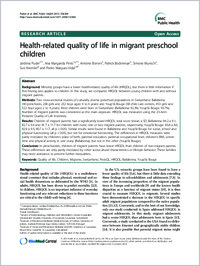Health-related quality of life in migrant preschool children
- Puder, Jardena Centre Hospitalier Universitaire Vaudois, University of Lausanne
- Pinto, Ana Margarida Centre Hospitalier Universitaire Vaudois, University of Lausanne
- Bonvin, Antoine Université de Lausanne
- Bodenman, Patrick Policlinique Médicale Universitaire, Lausanne
- Munsch, Simone Universität Fribourg, Schweiz
- Kriemler, Susi Universität Basel
- Marques-Vidal, Pedro Institute of Social and Preventive Medicine (IUMSP), University of Lausanne
-
25.04.2013
Published in:
- BMC Public Health. - 2013, vol. 13, no. 384, p. 1-9
English
Background: Minority groups have a lower health-related quality of life (HRQOL), but there is little information if this finding also applies to children. In this study, we compared HRQOL between young children with and without migrant parents. Methods: Two cross-sectional studies of culturally diverse preschool populations in Switzerland: Ballabeina (40 preschools, 258 girls and 232 boys aged 4 to 6 years) and Youp’là Bouge (58 child care centers, 453 girls and 522 boys aged 2 to 4 years). Most children were born in Switzerland (Ballabeina: 92.3%; Youp’là Bouge: 93.7%). Number of migrant parents was considered as the main exposure. HRQOL was measured using the 23-item Pediatric Quality of Life Inventory. Results: Children of migrant parents had a significantly lower HRQOL total score (mean ± SD, Ballabeina: 84.2 ± 9.1; 82.7 ± 9.6 and 81.7 ± 11.7 for children with none, one or two migrant parents, respectively; Youp’là Bouge: 83.8 ± 8.6; 82.9 ± 9.5; 80.7 ± 11.7, all p < 0.05). Similar results were found in Ballabeina and Youp’là Bouge for social, school and physical functioning (all p < 0.05), but not for emotional functioning. The differences in HRQOL measures were partly mediated by children’s place of birth, parental education, paternal occupational level, children’s BMI, screen time and physical activity in one study (Ballabeina), but not in the other (Youp’là Bouge). Conclusion: In preschoolers, children of migrant parents have lower HRQOL than children of non- migrant parents. These differences are only partly mediated by other sociocultural characteristics or lifestyle behavior. These families may need assistance to prevent further inequalities.
- Faculty
- Faculté des lettres et des sciences humaines
- Department
- Département de Psychologie
- Language
-
- English
- Classification
- Medicine
- License
-
License undefined
- Identifiers
-
- RERO DOC 323668
- DOI 10.1186/1471-2458-13-384
- Persistent URL
- https://folia.unifr.ch/unifr/documents/307553
Statistics
Document views: 120
File downloads:
- Texte intégral: 197
